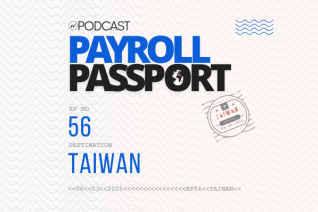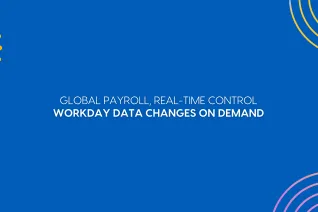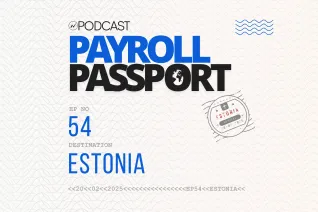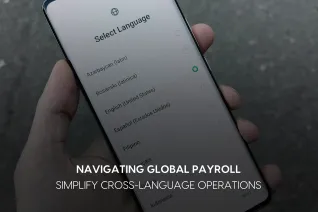Country Spotlight: Payroll in Italy

With one of Europe’s largest economies and home to thousands of multinational companies, Italy is a strategic destination for global businesses. Yet, managing payroll in Italy presents unique challenges, from navigating complex tax systems to complying with collective agreements (CCNLs).
With non-compliance penalties averaging €3,000 per infraction, understanding the intricacies of Italy payroll compliance isn't just about operational efficiency—it's about avoiding costly mistakes and ensuring sustainable growth in one of Europe's most strategic markets.
ALSO READ I Italy: A Guideline to Payroll and Employer of Record
What are the key Steps for Payroll Compliance in Italy?
Before initiating any payroll process in Italy, companies must secure the codice fiscale, a crucial step in managing payroll in Italy. This unique tax identification number is required for every employee. This identifier, obtained from the Agenzia delle Entrate, is fundamental to Italian payroll operations and affects over 23 million employed individuals across the country.
The working relationship in Italy is governed by Collective Bargaining Agreements (CCNLs), with over 800 active agreements across different sectors. These agreements meticulously detail everything from working hours to contribution rates, varying by industry and the number of employees. With CCNLs covering approximately 80% of the Italian workforce, understanding and applying the correct agreement is crucial for compliance and proper payroll management. These agreements are updated every 2-3 years on average, requiring employers to stay informed about changes that might affect their payroll calculations.
What is the Italian Payroll Tax System and its Contributions?
The Italian payroll tax system operates on a progressive income tax framework, with rates ranging from 23% to 43%. Social security in Italy, managed by the Istituto Nazionale della Previdenza Sociale (INPS), typically requires employer contributions of around 27-32% of gross salary, while employees contribute approximately 9-10%. The National Social Security Institute strictly oversees these contributions, with specific reporting requirements including monthly UNIEMENS declarations.
A distinctive feature of Italian payroll is the Trattamento di Fine Rapporto (TFR), or end-of-service allowance. This mandatory provision, approximately 7% of annual gross salary, can either remain with the employer or be directed to a pension fund. With the average TFR liability per employee reaching €30,000 after ten years of service, proper management of these calculations and employee choices regarding pension fund allocation is essential for compliance.
TUNE IN I Payroll Passport Ep 25. Italy

Managing Payroll in Italy: Complexities and Challenges
The payroll system's complexity extends beyond basic compensation. Annual leave management requires precise tracking, with employees entitled to a minimum of 4 weeks of paid time off, plus an average of 11 national holidays. The standard working hours are capped at 40 hours per week, with overtime regulations varying by CCNL.
Companies must also manage:
- Multiple monthly calculations, including the mandatory 13th month salary (and often a 14th month in certain sectors)
- Complex tax and social security contribution calculations
- Strict compliance requirements with financial penalties for violations
- Regular reporting and certifications
- Regional tax variations that can range from 1.23% to 3.33%
Additional requirements apply based on company size. Organizations with more than 50 employees must prepare biennial gender equality reports. The DURC (Document of Regular Contribution) serves as proof of compliance with social security obligations and is essential for business operations, particularly when working with public sector clients or applying for government incentives.
How do we navigate the System Successfully?
Success in managing payroll in Italy requires a thorough understanding of Italian payroll compliance and local regulations. The Libro Unico del Lavoro (LUL) must be maintained meticulously, documenting all aspects of employment relationships. Working hours, annual leave, and overtime must be tracked precisely to ensure accurate payroll processing. Companies must also stay current with previdenza sociale requirements and maintain proper documentation of all tax and social security contributions.
For multinational companies, navigating this intricate payroll landscape often requires expert guidance. A global payroll provider with deep local expertise can help ensure compliance while managing the complexity of Italian requirements. This becomes particularly crucial when handling various aspects such as:
- Implementing correct contribution rates across different employee salaries (categories)
- Managing complex leave entitlements and working hour regulations
- Ensuring accurate application of collective bargaining agreements
- Meeting strict reporting deadlines to avoid financial penalties
- Coordinating with local authorities and maintaining proper documentation
ALSO READ I Complexities in European Cross-border Payroll Management
LIVE WEBINAR ALERT I Beyond Compliance: Time Tracking’s Role in Shaping Europe’s Future Workforce
What is the Future of Payroll in Italy?
The Italian payroll system continues to evolve, with digital transformation initiatives changing how companies interact with government authorities. With non-compliance penalties increasing by an average of 7% annually, understanding these changes and maintaining compliance requires ongoing attention and expertise.
Through proper understanding and support, companies can successfully navigate Italy's sophisticated payroll architecture while ensuring full compliance with local regulations. Partnering with experienced professionals who understand both local requirements and global best practices can transform this complex process into a manageable operation, allowing businesses to focus on growth while maintaining compliance with Italy's demanding payroll requirements.
Why choose Neeyamo for your Global payroll needs?
Unlock the power of seamless global payroll management with Neeyamo's expert global payroll services. Neeyamo helps you navigate complex payroll regulations in 160+ countries, ensuring compliance and minimizing risks. Not convinced yet? Here's why we're your ideal partner:
Regulatory Roadblocks? Confidently navigate complex international laws & regulations.
Irritated with Integration? Seamlessly stitch together your HR systems.
Chaotic Control? Command your global workforce from a single platform.
Tardy Transactions? Ensure prompt and precise payroll processing.
Doubtful Digital Defense? Shield your sensitive information from digital threats.
Neeyamo? Your passport to hassle-free global payroll!
As you expand your business in Italy, remember that a happy and well-compensated workforce leads to a thriving business. For more information, contact irene.jones@neeyamo.com.
Latest Resources
Stay informed with latest updates
If you're curious and have a thirst for knowledge pertaining to the HR, payroll, and EOR universe, don't miss out on subscribing to our resources.
















